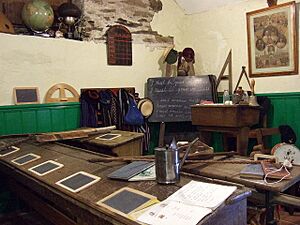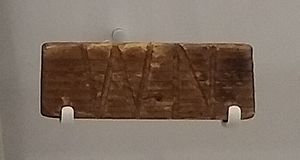Welsh Not facts for kids
The Welsh Not was a special token used in some schools in Wales during the 1800s and early 1900s. Teachers used it to try and stop children from speaking the Welsh language at school. If a child was heard speaking Welsh, they would get the Welsh Not.
The Welsh Not could look different depending on the school. Often, it was a piece of wood on a string that children had to wear around their neck. Other names for it included Welsh note, Welsh lump, Welsh stick, or Welsh Mark.
Contents
What Was the Welsh Not?
During the 1800s, a main goal for schools in Wales was to teach children English. Many Welsh parents and people supported this because they believed knowing English would help their children get better jobs and opportunities.
Some schools used a method called "total immersion." This meant they tried to make children speak only English, even during playtime. If a child was caught speaking Welsh, they might be given the Welsh Not as a punishment.
The Welsh Not was not a rule from the government. Instead, it was something teachers and school groups, like the National Society, decided to do. It was used from as early as 1798 and continued into the early 1900s. There is strong proof it was used in places like Carmarthen, Cardigan, and Meirionnydd.
How the Welsh Not Was Used
The Welsh Not came in different shapes and had various names. It was usually a piece of wood, sometimes with the letters 'WN' carved into it. A child would wear it around their neck.
Here's how it often worked:
- At the start of a lesson, day, or week, the first child caught speaking Welsh would get the token.
- If another child spoke Welsh, the token would be passed to them.
- At the end of the set time, the child who had the token, or all children who had held it, would be punished.
The punishments varied. They could include:
- Staying after school (detention).
- Having to write lines many times.
- Physical punishment, like being hit.
Some people even said that this system made children spy on their friends. They would secretly visit other children's homes to catch them speaking Welsh to their parents, just to pass the punishment to someone else.
Why Was English Promoted?
Physical punishment was common in all schools in the United Kingdom until it was mostly stopped in 1986. Hitting children with canes was widely used in British schools during the 1800s.

In the 1500s, King Henry VIII passed laws that changed how Wales was governed. These laws made English law and ways of running things the standard. Public officials had to speak English, and English was used in courts.
This meant that people who only spoke Welsh often found it difficult in court. It also made many people realize that speaking English was important if they wanted to succeed in a society where England and English culture were dominant.
However, the Welsh language remained strong among ordinary people. A history professor named Martin Johnes says that the Welsh language actually grew in some areas after these laws. He also notes that the government at the time supported the Welsh language for religious reasons. For example, in 1546, the first Welsh-language book was published. Later, in 1567, the Crown ordered that a Welsh translation of the New Testament be used in every church in Wales. This helped keep Welsh as the language of religion.
The "Blue Books" Report
Around the time the Welsh Not was used, many ordinary Welsh people felt unfriendly towards the English language. This feeling grew stronger after a report called the "Blue Books" was published in 1847. This report, from the British Government, criticized the Welsh people, their language, and their way of life. It caused a lot of anger in Wales. Even though the report didn't lead to new government laws, the negative comments about Welsh culture were very upsetting.
How People Felt About It
The Welsh Not created a feeling of shame around speaking the Welsh language.
Some people, called "Welsh patriots," saw the Welsh Not as a way to destroy Welsh culture. However, some parents actually liked it. They thought it helped their children learn English every day, which they believed was important for their future.
After the Education Act of 1870, groups like the Society for the Utilisation of the Welsh Language started fighting for the right to speak Welsh and learn through Welsh in schools. They wanted schools to teach both languages. Their efforts led to schools being encouraged to teach Welsh history and geography. However, the education system in Wales still became more and more like the English system.
In 2012, a politician named David TC Davies said that the British Government was not responsible for stopping the Welsh language in the 1800s. He pointed out that the Welsh Not was used before the government got involved in education, and that Welsh teachers and parents often agreed to its use.
Professor Martin Johnes explains that the Welsh Not was not an official government rule. Instead, it was something individual teachers chose to do. But, he adds, the Welsh Not is still seen as a powerful symbol of how Welsh culture was treated unfairly.
In literature
- Myrddin ap Dafydd (2019). Under the Welsh Not, Llanrwst, Gwasg Carreg Gwalch ISBN: 978-1845276836
See also
- Dialect card – A similar item used in Japanese schools to promote standard speech.
- Symbole – A similar object used in French schools to punish students for speaking regional languages.


